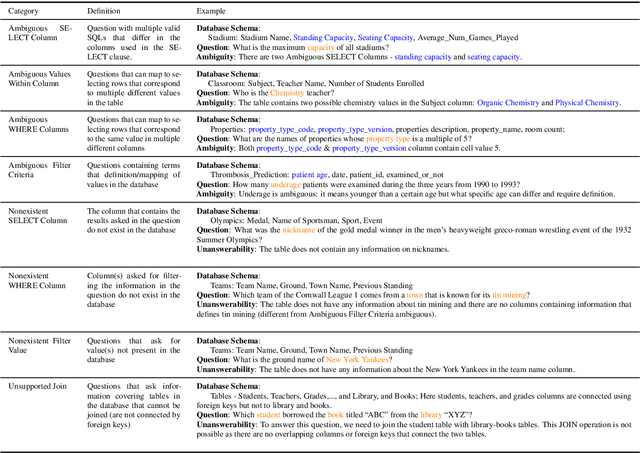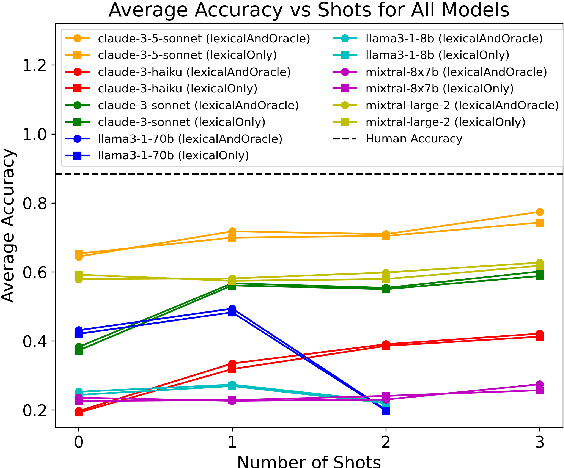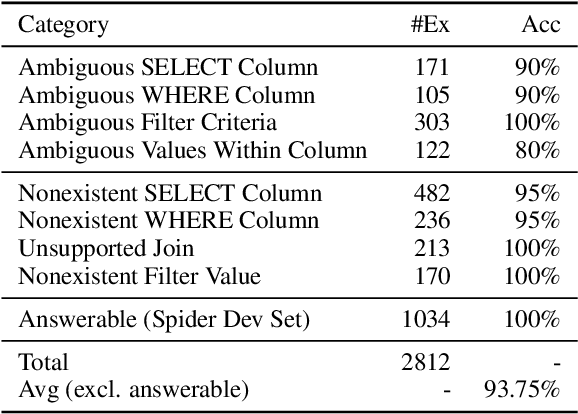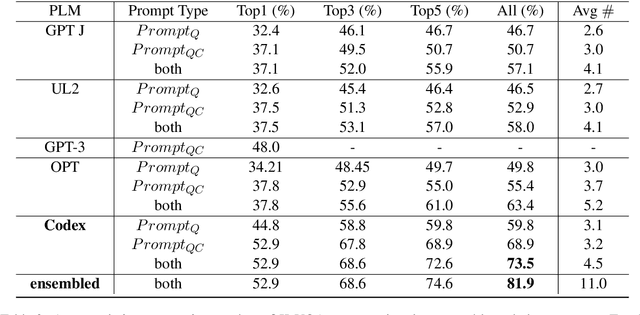Patrick Ng
From Sight to Insight: Improving Visual Reasoning Capabilities of Multimodal Models via Reinforcement Learning
Jan 01, 2026Abstract:Reinforcement learning (RL) has emerged as a promising approach for eliciting reasoning chains before generating final answers. However, multimodal large language models (MLLMs) generate reasoning that lacks integration of visual information. This limits their ability to solve problems that demand accurate visual perception, such as visual puzzles. We show that visual perception is the key bottleneck in such tasks: converting images into textual descriptions significantly improves performance, yielding gains of 26.7% for Claude 3.5 and 23.6% for Claude 3.7. To address this, we investigate reward-driven RL as a mechanism to unlock long visual reasoning in open-source MLLMs without requiring costly supervision. We design and evaluate six reward functions targeting different reasoning aspects, including image understanding, thinking steps, and answer accuracy. Using group relative policy optimization (GRPO), our approach explicitly incentivizes longer, structured reasoning and mitigates bypassing of visual information. Experiments on Qwen-2.5-VL-7B achieve 5.56% improvements over the base model, with consistent gains across both in-domain and out-of-domain settings.
DSMentor: Enhancing Data Science Agents with Curriculum Learning and Online Knowledge Accumulation
May 20, 2025Abstract:Large language model (LLM) agents have shown promising performance in generating code for solving complex data science problems. Recent studies primarily focus on enhancing in-context learning through improved search, sampling, and planning techniques, while overlooking the importance of the order in which problems are tackled during inference. In this work, we develop a novel inference-time optimization framework, referred to as DSMentor, which leverages curriculum learning -- a strategy that introduces simpler task first and progressively moves to more complex ones as the learner improves -- to enhance LLM agent performance in challenging data science tasks. Our mentor-guided framework organizes data science tasks in order of increasing difficulty and incorporates a growing long-term memory to retain prior experiences, guiding the agent's learning progression and enabling more effective utilization of accumulated knowledge. We evaluate DSMentor through extensive experiments on DSEval and QRData benchmarks. Experiments show that DSMentor using Claude-3.5-Sonnet improves the pass rate by up to 5.2% on DSEval and QRData compared to baseline agents. Furthermore, DSMentor demonstrates stronger causal reasoning ability, improving the pass rate by 8.8% on the causality problems compared to GPT-4 using Program-of-Thoughts prompts. Our work underscores the importance of developing effective strategies for accumulating and utilizing knowledge during inference, mirroring the human learning process and opening new avenues for improving LLM performance through curriculum-based inference optimization.
Towards Better Understanding Table Instruction Tuning: Decoupling the Effects from Data versus Models
Jan 24, 2025



Abstract:Recent advances in natural language processing have leveraged instruction tuning to enhance Large Language Models (LLMs) for table-related tasks. However, previous works train different base models with different training data, lacking an apples-to-apples comparison across the result table LLMs. To address this, we fine-tune base models from the Mistral, OLMo, and Phi families on existing public training datasets. Our replication achieves performance on par with or surpassing existing table LLMs, establishing new state-of-the-art performance on Hitab, a table question-answering dataset. More importantly, through systematic out-of-domain evaluation, we decouple the contributions of training data and the base model, providing insight into their individual impacts. In addition, we assess the effects of table-specific instruction tuning on general-purpose benchmarks, revealing trade-offs between specialization and generalization.
PRACTIQ: A Practical Conversational Text-to-SQL dataset with Ambiguous and Unanswerable Queries
Oct 14, 2024



Abstract:Previous text-to-SQL datasets and systems have primarily focused on user questions with clear intentions that can be answered. However, real user questions can often be ambiguous with multiple interpretations or unanswerable due to a lack of relevant data. In this work, we construct a practical conversational text-to-SQL dataset called PRACTIQ, consisting of ambiguous and unanswerable questions inspired by real-world user questions. We first identified four categories of ambiguous questions and four categories of unanswerable questions by studying existing text-to-SQL datasets. Then, we generate conversations with four turns: the initial user question, an assistant response seeking clarification, the user's clarification, and the assistant's clarified SQL response with the natural language explanation of the execution results. For some ambiguous queries, we also directly generate helpful SQL responses, that consider multiple aspects of ambiguity, instead of requesting user clarification. To benchmark the performance on ambiguous, unanswerable, and answerable questions, we implemented large language model (LLM)-based baselines using various LLMs. Our approach involves two steps: question category classification and clarification SQL prediction. Our experiments reveal that state-of-the-art systems struggle to handle ambiguous and unanswerable questions effectively. We will release our code for data generation and experiments on GitHub.
You Only Read Once (YORO): Learning to Internalize Database Knowledge for Text-to-SQL
Sep 18, 2024



Abstract:While significant progress has been made on the text-to-SQL task, recent solutions repeatedly encode the same database schema for every question, resulting in unnecessary high inference cost and often overlooking crucial database knowledge. To address these issues, we propose You Only Read Once (YORO), a novel paradigm that directly internalizes database knowledge into the parametric knowledge of a text-to-SQL model during training and eliminates the need for schema encoding during inference. YORO significantly reduces the input token length by 66%-98%. Despite its shorter inputs, our empirical results demonstrate YORO's competitive performances with traditional systems on three benchmarks as well as its significant outperformance on large databases. Furthermore, YORO excels in handling questions with challenging value retrievals such as abbreviation.
Towards a Holistic Evaluation of LLMs on Factual Knowledge Recall
Apr 24, 2024Abstract:Large language models (LLMs) have shown remarkable performance on a variety of NLP tasks, and are being rapidly adopted in a wide range of use cases. It is therefore of vital importance to holistically evaluate the factuality of their generated outputs, as hallucinations remain a challenging issue. In this work, we focus on assessing LLMs' ability to recall factual knowledge learned from pretraining, and the factors that affect this ability. To that end, we construct FACT-BENCH, a representative benchmark covering 20 domains, 134 property types, 3 answer types, and different knowledge popularity levels. We benchmark 31 models from 10 model families and provide a holistic assessment of their strengths and weaknesses. We observe that instruction-tuning hurts knowledge recall, as pretraining-only models consistently outperform their instruction-tuned counterparts, and positive effects of model scaling, as larger models outperform smaller ones for all model families. However, the best performance from GPT-4 still represents a large gap with the upper-bound. We additionally study the role of in-context exemplars using counterfactual demonstrations, which lead to significant degradation of factual knowledge recall for large models. By further decoupling model known and unknown knowledge, we find the degradation is attributed to exemplars that contradict a model's known knowledge, as well as the number of such exemplars. Lastly, we fine-tune LLaMA-7B in different settings of known and unknown knowledge. In particular, fine-tuning on a model's known knowledge is beneficial, and consistently outperforms fine-tuning on unknown and mixed knowledge. We will make our benchmark publicly available.
Propagation and Pitfalls: Reasoning-based Assessment of Knowledge Editing through Counterfactual Tasks
Jan 31, 2024Abstract:Current approaches of knowledge editing struggle to effectively propagate updates to interconnected facts. In this work, we delve into the barriers that hinder the appropriate propagation of updated knowledge within these models for accurate reasoning. To support our analysis, we introduce a novel reasoning-based benchmark -- ReCoE (Reasoning-based Counterfactual Editing dataset) -- which covers six common reasoning schemes in real world. We conduct a thorough analysis of existing knowledge editing techniques, including input augmentation, finetuning, and locate-and-edit. We found that all model editing methods show notably low performance on this dataset, especially in certain reasoning schemes. Our analysis over the chain-of-thought generation of edited models further uncover key reasons behind the inadequacy of existing knowledge editing methods from a reasoning standpoint, involving aspects on fact-wise editing, fact recall ability, and coherence in generation. We will make our benchmark publicly available.
Few-Shot Data-to-Text Generation via Unified Representation and Multi-Source Learning
Aug 10, 2023Abstract:We present a novel approach for structured data-to-text generation that addresses the limitations of existing methods that primarily focus on specific types of structured data. Our proposed method aims to improve performance in multi-task training, zero-shot and few-shot scenarios by providing a unified representation that can handle various forms of structured data such as tables, knowledge graph triples, and meaning representations. We demonstrate that our proposed approach can effectively adapt to new structured forms, and can improve performance in comparison to current methods. For example, our method resulted in a 66% improvement in zero-shot BLEU scores when transferring models trained on table inputs to a knowledge graph dataset. Our proposed method is an important step towards a more general data-to-text generation framework.
Generate then Select: Open-ended Visual Question Answering Guided by World Knowledge
May 30, 2023



Abstract:The open-ended Visual Question Answering (VQA) task requires AI models to jointly reason over visual and natural language inputs using world knowledge. Recently, pre-trained Language Models (PLM) such as GPT-3 have been applied to the task and shown to be powerful world knowledge sources. However, these methods suffer from low knowledge coverage caused by PLM bias -- the tendency to generate certain tokens over other tokens regardless of prompt changes, and high dependency on the PLM quality -- only models using GPT-3 can achieve the best result. To address the aforementioned challenges, we propose RASO: a new VQA pipeline that deploys a generate-then-select strategy guided by world knowledge for the first time. Rather than following the de facto standard to train a multi-modal model that directly generates the VQA answer, RASO first adopts PLM to generate all the possible answers, and then trains a lightweight answer selection model for the correct answer. As proved in our analysis, RASO expands the knowledge coverage from in-domain training data by a large margin. We provide extensive experimentation and show the effectiveness of our pipeline by advancing the state-of-the-art by 4.1% on OK-VQA, without additional computation cost. Code and models are released at http://cogcomp.org/page/publication_view/1010
Benchmarking Diverse-Modal Entity Linking with Generative Models
May 27, 2023Abstract:Entities can be expressed in diverse formats, such as texts, images, or column names and cell values in tables. While existing entity linking (EL) models work well on per modality configuration, such as text-only EL, visual grounding, or schema linking, it is more challenging to design a unified model for diverse modality configurations. To bring various modality configurations together, we constructed a benchmark for diverse-modal EL (DMEL) from existing EL datasets, covering all three modalities including text, image, and table. To approach the DMEL task, we proposed a generative diverse-modal model (GDMM) following a multimodal-encoder-decoder paradigm. Pre-training \Model with rich corpora builds a solid foundation for DMEL without storing the entire KB for inference. Fine-tuning GDMM builds a stronger DMEL baseline, outperforming state-of-the-art task-specific EL models by 8.51 F1 score on average. Additionally, extensive error analyses are conducted to highlight the challenges of DMEL, facilitating future research on this task.
 Add to Chrome
Add to Chrome Add to Firefox
Add to Firefox Add to Edge
Add to Edge